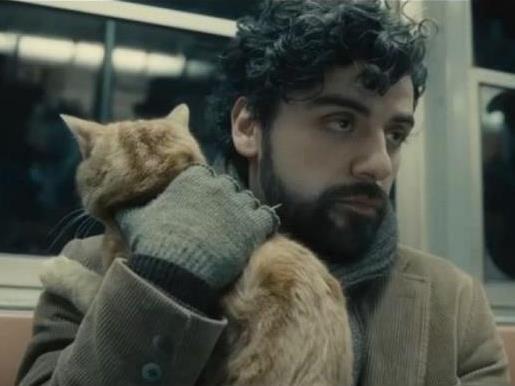Like the folk songs that slither sorrowfully from his lips, things are never new, nor do they ever get old for Llewyn Davis (Oscar Isaac, The Bourne Legacy). Instead, opportunity and habit forms a messy cycle through which he staggers. In New York circa 1961, the hapless Llewyn has undisputed talent and tenacity, but his unhappy plight stems from unfortunate circumstances and mistaken decisions. Once part of a duo, sans partner he scrambles for gigs and recognition as a solo artist. His dismal personal life matches his attempts to eke out a living, night-after-night spent shuffling between friends’ couches.
Thus circles Inside Llewyn Davis, the latest filmic fable from brothers Ethan and Joel Coen (True Grit). Over the course of one wan and wintry week, Llewyn’s melange of mis-steps and self-sabotage makes his a melancholy existence. He upsets many: vocalist Jean (Carey Mulligan, The Great Gatsby) with his presence in her relationship, his sister Joy (Jeanine Serralles, Two Lovers) with his profanity and apathy, and dinner host Lillian (Robin Bartlett, Shutter Island) with his refusal to perform. He relies upon the kindness of others: Jean’s beau Jim (Justin Timberlake, Runner Runner) brings him in on a session recording, new pal Al Cody (Adam Driver, Tracks) provides a place to stay, and Gaslight Café owner Pappi (Max Casella, Blue Jasmine) throws him a gig. Others – kindly singer and soldier Troy (Stark Sands, TV’s Generation Kill), and record producer Bud Grossman (F. Murray Abraham, Dead Man Down) – fall into his sarcastic, struggling orbit.
The list continues. Llewyn’s lyrics opine his hopelessness and loneliness, as his episodic journey can only confirm. The writing, directing, editing and producing Coens take their tumultuous protagonist through the seemingly incidental and tangential, but in their trademark surrealist, existential fashion. From a road trip with John Goodman’s jazz musician – the actor easily stepping out of any of the filmmaking siblings’ features – to chasing a ginger cat ostensibly from the Upper West Side through Greenwich Village to Chicago and back, no excursion off the beaten path is without its narrative merits. Indeed, there is no well-trodden trail that fits Llewyn’s scenario. So it is that Inside Llewyn Davis unfurls as a catalogue of personality-fuelled errors in the service of chasing a dream. Comparisons abound with the tonally distinctive but thematically similar Frances Ha, both perched on the precipice of the aspirational and the unattainable.
Reality informs the Coens’ elegant effort, its time and place thrumming with the vibe of history in actuality and in subversion – and yet, this is never anything but their creation. The marriage of song and odyssey may recall O Brother Where Art Thou?’s comparable wanderings. However Inside Llewyn Davis’ evolution in their ethos spans from a much larger pool. Llewyn is the archetypal – but never stereotypical – Coen anti-hero, wanting more than his current lot, but not quite able to achieve his goals. His quest comes from their playbook, beset on all sides by the cruel and the coincidental as the ordinary turns offbeat and vice versa. The cat, as cute as can be, offers a symbol of his professional doggedness and personal diversions, as well as a digression from standard routine for the character to saddle with his slight hopes of redemption.
Of course, though continually tinged with the most raw and resonant of sadness, warm and black comedy quietly crackles; Llewyn’s antics, as sharply written and set up to flounder, cleverly elicit amusement as well as understanding. The helmers have proven their mastery of the combination time and again, and their best is at work here, moving as their protagonist stumbles and entertaining as he endeavours to cope. Their knack for lead casting again rears its head, with Isaac – all melodious voice and mournful eyes – the striking centrepiece. His musical prowess thrusts the film from the soulful to the sublime, even in the comic interlude that is the jaunty ditty ‘Please Mr. Kennedy’. As Llewyn’s line between success and failure comes into focus, Issac is shrewdly sympathetic. Intensity emanates from his gaze and sorrow from his stance, crafting a portrait of the poignant and the pained that holds up a mirror for all who have strived, been selfish, and fallen by the wayside.
Technical feats befit the passion and precision of the filmmakers and their star, both immersed in a world of period authenticity. Cinematographer Bruno Delbonnel’s (Dark Shadows) efforts in enlivening the directors’ usual visual signatures are stellar, but credit for the richness beyond the brown and grey-tinged palette must extend to the impeccable work of production designer Jess Gonchor (The Lone Ranger), art director Deborah Jensen (A Serious Man), set decorator Susan Bode (Men in Black 3) and costume designer Mary Zophres (Gangster Squad). As deftly cut together by the brothers under their pseudonym of Roderick Jaynes, with a soundtrack produced by T-Bone Burnett (Crazy Heart), this is a film that feels, sings and looks the part in all its frames and facets. At their best, the Coens duck and weave through the depths of human experience with the footprint of the fresh and the familiar, as rendered with emotional and aesthetic texture. At their best, they provide Inside Llewyn Davis.
Rating: 5 stars out of 5
Inside Llewyn DavisDirector: Ethan and Joel Coen
US, 2013, 104 mins
Release date: January 16
Distributor: Roadshow
Rated: M
Actors:
Director:
Format:
Country:
Release:





